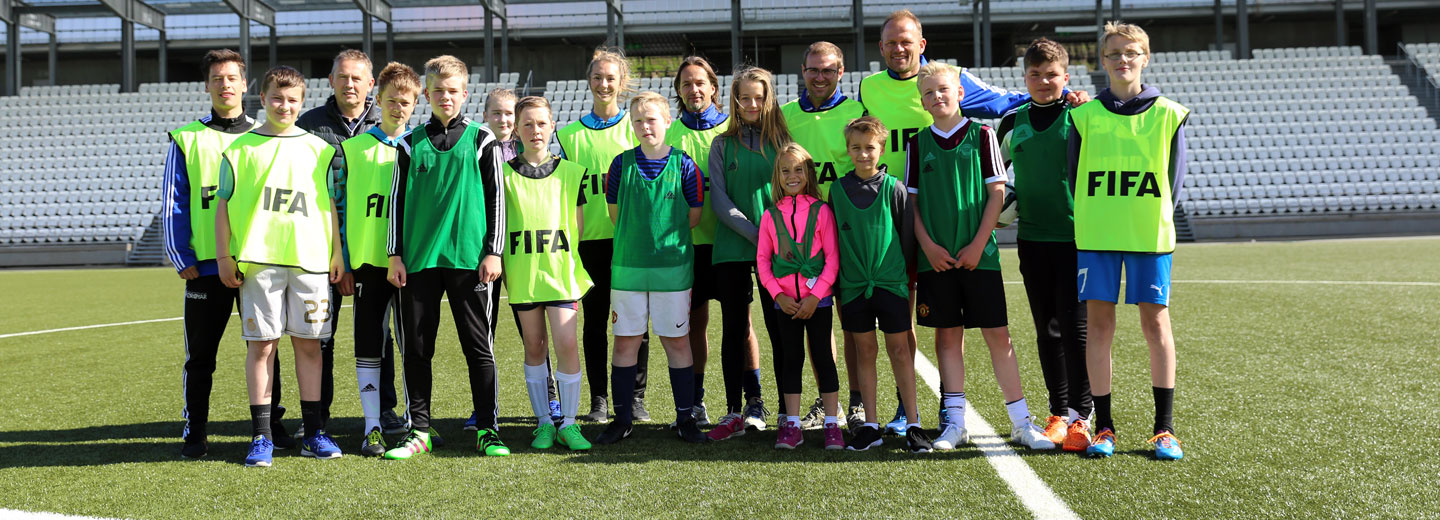
Football training in school greatly improves girls’ fitness and health
Schoolgirls can achieve lower blood pressure, stronger muscles, better balance and improved jumping performance if their school puts football training on the timetable – including girls who have never played football before.
Using football as a form of exercise in Danish municipal primary and lower-secondary schools is a great idea. All children can benefit from the activity, including girls who are not used to exercise. This is the finding of a study of the FIFA 11 for Health in Europeexercise concept in Faroese schoolchildren carried out by football researchers at the University of Southern Denmark, Department of Sports Science and Clinical Biomechanics. The results of the study have just been published in the acclaimed Scandinavian Journal of Medicine and Science in Sports:
‟The study shows that teaching health on the football pitch improves 10–12-year-old girls’ muscle strength, muscle mass, balance and blood pressure –including in girls who have no previous experience of football,″says Peter Krustrup, head of research and professor of sport and health sciences at the University of Southern Denmark.
The University of Southern Denmark joined with the University of the Faroe Islands in a study of 400 children at 12 Faroese schools in which the 5th-grade children played football for 45 minutes twice a week for 11 weeks.
Good for both fitness and camaraderie
The study is a follow-up to previous studies of FIFA 11 for Health in Europe. The concept, consisting of football training combined with health teaching, has been introduced to 10,000 Danish children and will now being further rolled out in all 98 municipalities in Denmark.
‟Ourprevious studies have shown that the FIFA 11 for Health in Europeconcept improves 10–12-year-old schoolchildren’s health profile, cognitive function and social well-being, while increasing their understanding of physical activity, varied and healthy eating, hygiene and bad habits around tobacco and alcohol. Now we can add that this form of football, with the focus on ball games and small pitches, is very inclusive and produces great improvements in physical fitness and health profile in schoolgirls, even if they have no previous football experience,″says Peter Krustrup.
The project to teach health on the football pitch is helping children to meet the Danish Health Authority’s recommendation of at least three times 30 minutes of high-intensity training a week and the primary and lower-secondary school reform’s requirement for 45 minutes of daily physical activity.
‟In the Faroe Islands, there is a high level of awarenessof this project to teach health on the football pitch, and satisfaction that it’s working for both girls and boys. It’s likely that, from the next school year, the project will be implemented in grades 4 to 6 at all Faroese municipal primary and lower-secondary schools,″says Magni Mohr, associate professor at the University of Southern Denmark and head of the Faroese Institute for Public Health, who has 10 years’ experience of projects relating to ball games and health.
FACTS: About the study
The children in the trial were girls and boys aged 10–12 at 12 Faroese municipal primary and lower-secondary schools. They were divided into an intervention group (292 participants from 9 schools) and a control group (100 participants from 3 schools).
In the intervention group, the children played football for 45 minutes twice a week. The researchers found that the training had the following effects on the children’s health:
- systolic blood pressure decreased by 6 mmHg compared to the control group
- muscle mass increased by 400 g compared to the control group
- balance performance increased by 1.5 sec compared to the control group
- horizontal jumping performance increased by 10 cm compared to the control group
The study concludes that football training is suitable for improving physical fitness and strength in 10–12-year-old schoolchildren, and boosts early prevention of lifestyle diseases.
The girls achieved improvements in systolic blood pressure (5 mmHg), mean blood pressure (2 mmHg), muscle mass (0.7 kg), horizontal jumping performance (13 cm) and balance (2.1 sec). The improvements were just as pronounced in the 84% of girls who did not normally play football in a football club.
The study was implemented with funding from the Faroese Institute for Public Health, the Faroese Football Association, the Danish Football Association and FIFA’s research unit F-MARC.
Read the scientific article here.
FACTS: What is FIFA 11 for Health in Europe
- FIFA 11 for Health is an 11-week programme of teaching health on the football pitch in which the children train, play and learn.
- The project was originally developedin 2009 for teaching in Africa, where football training was combined with messages about hygiene, HIV, malaria and clean water.
- The European version was created in a collaboration between Professor Peter Krustrup, the Danish Football Association and FIFA’s research unit F-MARC.
- In the European version, there are two 45-minute lessons a week and the health messages are related in particular to physical activity, varied diet and social well-being.
- The focus is on small-sided games – football played as e.g. 3v3 on small pitches.
- Small-sided games are motivational and inclusive because all children are involved in the game and have a lot of touches of the ball.
- In small-sided games, the intensity is high, which has a positive impact on fitness, bone health and a number of other health parameters.
- At the same time, the children’s social well-being is improved, partly through the use of Praise Partners, where the children are split into pairs and give each other positive feedback after the activities.
Watch a video explaining the concept here.
Contact persons
Professor Peter Krustrup, head of research
Department of Sports Science and Clinical Biomechanics
University of Southern Denmark
pkrustrup@health.sdu.dk; +45 2116 1530
Bo Kousgaard, communications officer
Department of Sports Science and Clinical Biomechanics
University of Southern Denmark
bkousgaard@health.sdu.dk; +45 2323 8624